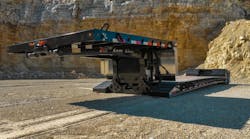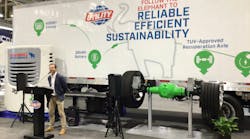NTDA assembled a panel of leading trailer finance company representatives to provide a market overview.
The panel included: Bruce Hoyle and Lise Longlade of DLL Financial Solutions; Heather Wilson, chief communications officer for BMO Transportation Finance; Kirk Mann, GM of transportation finance for Hitachi Capital America; and Jim Freund, EVP/CMO, ENGS Commercial Finance Company.
Moderator Richard Bloomquist, president of North Central Utility of Wisconsin LLC—Madison, provided the questions.
Q: The trailer industry does not have the captive financing sources some of our truck dealer friends have in place. How do you think financing options for trailer dealers will evolve over the next five to 10 years?
Hoyle: It’s interesting that the trailer industry doesn’t have the same captive finance setup as the trucking industry. So it’s often up to companies like ours, so we try to work with the manufacturers as well as we can. There’s usually some industry financing through the dealers—usually not much more than 30 days. But one thing that is missing is discounted or subsidized retail rates. So there are lots of great programs for trucking. I think that will tend to move into trailers more as competition stiffens. You might eventually see more manufacturer involvement with subsidies that will move the product as it gets more competitive.
Freund: We believe in our company that the finance business is going to be turned upside down over the next five years. The trailer finance business is a piece of that. You all probably heard the term Fintech. Financial technology. In the consumer space, it’s been around for at least five years. You can walk in and close a transaction and drive out with your car in almost an hour. The equipment finance is so archaic in the way they finance equipment today, and how long it takes to get a transaction approved and funded, that it’s just not sustainable. So we are seeing a lot of effort with other finance companies, including in our business, where we are developing tools that we will come out with early next year that will be very similar to the experience of going into an auto dealership. Getting your documents immediately and usually getting funded immediately. We can thank the consumer space. The big challenge equipment spaces have is that in the consumer space, you’re just underwriting the credit of the person. In the equipment space, you’re underwriting the credit of the person, but also validating collateral.
Wilson: The trailer industry did used to have captives. Our business purchased two of those captives, Great Dane and U-Haul, years ago. And so I think the one thing that the industry is always considering is, what is the best next move for all players involved? We’ve always had big ups and big downs. Those players who become captive or larger players in financial institutions have to be willing to weather those ups and downs. I think that’s just something that we’re going for in the industry. Luckily, we do have folks who have been in the industry a long time.
Mann: Specific to trailer manufacturers building relationships, obviously trailer manufacturers do that math. What does it take to support a captive? It’s been tough math. Otherwise, you’d see a bunch of trailer manufacturers [in financing], but you don’t. I think the technology aspects of the industry ultimately change the program quite a bit. But I would take it another step further, and that is, there are economic realities associated with operating a truck and trailer. You’re in the business. And there are a whole bunch more economics oriented around that truck and trailer than just the load you get to operate that truck or trailer. There’s fuel, there’s insurance, there’s maintenance. The lenders who are really going to be ahead of the ballgame seven or 10 years from now are going to figure out how to put all those economics together and do one lump on all those economics. That’s not going to be easy, but it’s possible. And it’s an offering I think you can look forward to. I’m saying it’s going to be awhile. But I do believe you’re going to see it. There’s another aspect to the whole business. There are services that will ultimately be wrapped around that offering you make your customer. So way beyond just a loan. But that’s down the road. Step one is technology and doing things faster, better, easier.
Q: Some of the dealers in the room are refrigerated trailer dealers. On the used side, financing used equipment has become an issue or is a challenge. One of the questions that came up was, do you look at the nature of a refrigerated trailer or refrigeration unit as being CARB-compliant for the length of the finance term when making your credit decision?
Freund: Because we’re an independent, we can in addition to being a credit lender, we can also apply collateral lending to our transaction. What I mean by that is, when have perhaps a marginal credit transaction that wouldn’t pass a credit test, if you can put up collateral, then you can pass a test and we can fund it.
Longlade: Even though you’re looking at the strength of the credit and overall profile of the equipment that we finance, CARB really doesn’t play into it. We rely on the fleets to maintain them and to adhere to the regulations and maintenance programs that are CARB-related.
Q: Over the course of the last 20-some years that I’ve been a trailer dealer, recourse has come and recourse has gone; recourse has been in favor, recourse has been out of favor with certain people. Can you give us an example today of when a dealer accepting recourse on a financing deal would be needed?
Hoyle: Recourse can make up for bad credit. It can make up for maybe an inexperienced or newer company, but often we don’t like to ask for recourse. If a dealer wants to offer it, we’ll take a look at it. We come back and we say that we’d rather have solutions—whether it’s a shorter term or down payment. But if recourse can help the deal, it’s often when a dealer knows a customer well. In some cases, it’s a customer known well for a long time and doesn’t have a long credit history or family member. The dealer knows the customer a lot better than we do. So they’re coming back and saying, “Look we know this guy will take recourse if the deal is priced properly and term-structured properly.” If they ever had to take the equipment back, they would be in a bad position, so we don’t want to put the dealer in jeopardy. But those are often the cases that come up when we work with recourse.
Freund: If there’s an opportunity for our dealers to sell more equipment through recourse, we will absolutely consider it. We won’t push it, but we will absolutely consider it on behalf of the dealers. It usually comes up in one of four scenarios. First, marginal credit where you need a bit more credit support. Two, perhaps out-of-favor collateral, where collateral is very, very specialized and our asset management team, when they look at it, they might not feel it’s comfortable to get out as quickly as we want to. Three, we’ve actually seen more of this, I’d say, because of compression in the marketplace in terms of lenders. Even with decent credit, perhaps you had a good credit who’s buying too much equipment in the last six months, or three months. We generally don’t like to see a customer grow that quickly. One of the ways around that is, you may say, “Listen, I’m willing to put in 25% recourse on this transaction.” The fourth scenario that we see is perhaps where we might approve credit for a 10% down payment. The customer might not have a 10% down payment. The dealer might say, “I’ll give you 10% recourse if you give me a zero-down transaction.”
Q: What information do we as dealers need to provide to your respective companies for you to make a credit decision? Do you look for more than a completed application in the amount of the sale?
Mann: A completed application would be nice—with all the lines filled in. But the biggest thing from my perspective is if we can get an invoice, a description of the collateral on there. We need some good specs so I know what I have. I can take those specs and really price that collateral in the marketplace, and sometimes it will help you if you’ll just have a good list of the specs. When we look at a deal and we do our math, and it doesn’t come out just perfect, sometimes there’s a story there. Maybe the guy has a FedEx contract that’s rock solid. Tell us the story. That’s going to help our analysts make a different decision potentially.









